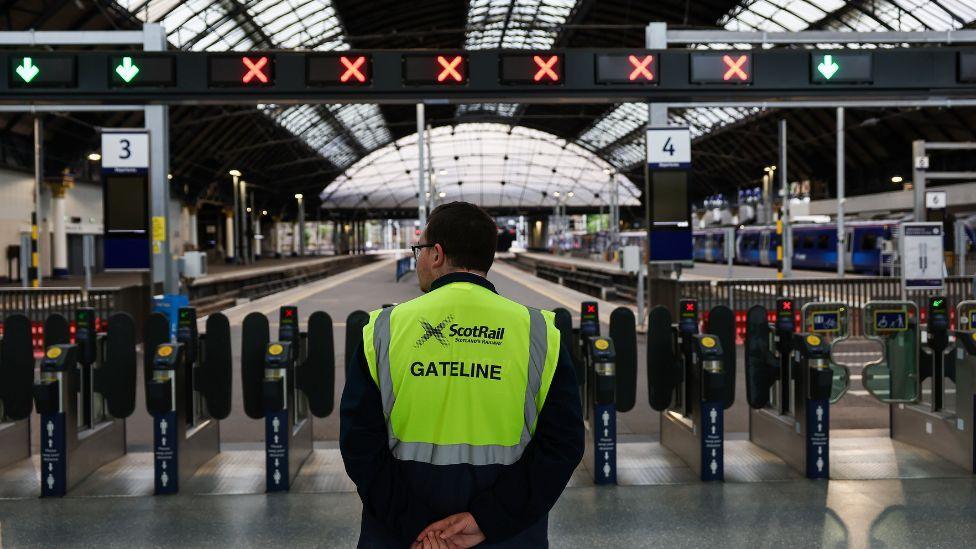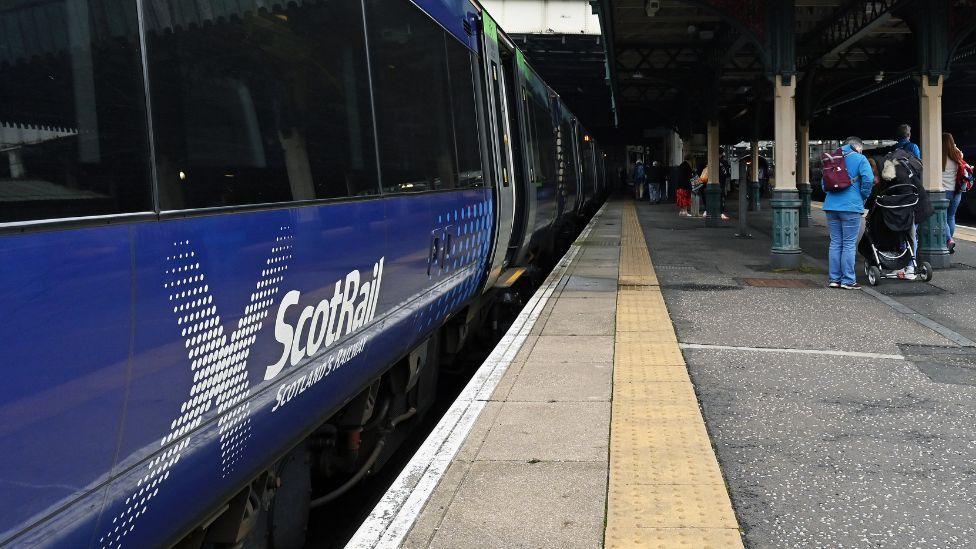Why a lack of train drivers is causing a problem for ScotRail

Unions are threatening industrial action amid a pay dispute with ScotRail
- Published
The introduction of a temporary timetable by ScotRail highlights a big long-term problem - it simply does not have enough drivers.
To keep the full timetable running, it relies on drivers agreeing to do overtime and work on rest days.
This working is entirely voluntary.
In recent days fewer drivers than normal have been available to do overtime amid an escalating row over pay.
That led to ScotRail cutting about 600 services in a bid to preserve the “certainty and reliability” of its services.
Rail pay dispute will spread across Scotland - union
- Published10 July 2024
ScotRail introduces reduced timetable amid pay row
- Published9 July 2024
ScotRail cancellations continue over staffing dispute
- Published8 July 2024
It is important to note the rail unions are not taking industrial action, even though the practical effect of the decisions many drivers have taken is similar to that of an official overtime ban.
ScotRail is not alone – most rail companies in the UK are also reliant on overtime from drivers to fulfil their timetables. And recent years have seen disputes at many operators.
The last pay dispute at ScotRail was two years ago - shortly after the train company was brought back into public ownership by the Scottish government.
The company agreed to recruit and train more new drivers to reduce its reliance on overtime but this takes time.
New drivers take part in a training programme which lasts between 18 and 24 months.
Public ownership
Bringing ScotRail into public ownership also means that the buck now stops with the Scottish government if things go wrong.
It also means that ScotRail has to work within the Scottish government's pay policy.
The current pay offer - rejected by the unions last week - is a three-year deal running from this April until 2027.
It would see staff get a 2% rise each April then a 1% rise the following January.
If ScotRail were to want to make an offer which broke the Scottish government's pay policy, it would need to get approval at a senior government level.

The drivers' union Aslef is set to decide next week whether to hold a ballot on actual industrial action at ScotRail.
The union will be all too aware of how drivers themselves have managed to cause a huge level of disruption already.
Realistically the earliest dates for any official action by the union would be in the latter half of August.
Then the Scottish government could be facing two significant public sector pay disputes.
It currently looks likely that council refuse workers will go on strike in mid-August in many parts of the country, including Edinburgh.
The nightmare scenario would be images of the rubbish piling up in Edinburgh during the festival while train services across Scotland are at a standstill.

Rubbish overflowed from bins in Edinburgh during a 2022 strike
Previous council pay disputes have only been settled after the Scottish government provided councils with extra money to help.
Teachers' unions are also deeply unhappy with this year's pay offer. Staff were due to get a rise in August.
If there is no progress early in the new term towards what the unions would see as an acceptable pay offer, it is likely that they will start to move in the direction of industrial action.
The thought of three significant public sector pay disputes which cause widespread inconvenience to the public would be something of a doomsday scenario for government ministers.
But time is running out to avoid this.
Related topics
- Published3 July 2024
